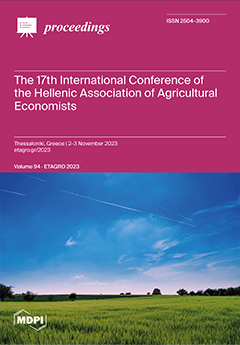Need Help?
Proceedings, 2024, ETAGRO 2023
The 17th International Conference of the Hellenic Association of Agricultural Economists
Thessaloniki, Greece | 2–3 November 2023
Volume Editor:
Eleni Theodoropoulou, Harokopio University of Athens, Greece
Printed Edition Available!
- Issues are regarded as officially published after their release is announced to the table of contents alert mailing list.
- You may sign up for e-mail alerts to receive table of contents of newly released issues.
- PDF is the official format for papers published in both, html and pdf forms. To view the papers in pdf format, click on the "PDF Full-text" link, and use the free Adobe Reader to open them.
Cover Story (view full-size image):
The 17th International Conference of the Hellenic Association of Agricultural Economists (ETAGRO 2023) took place in Thessaloniki, Greece, bringing together leaders, policymakers, academics,
[...] Read more.
The 17th International Conference of the Hellenic Association of Agricultural Economists (ETAGRO 2023) took place in Thessaloniki, Greece, bringing together leaders, policymakers, academics, scientists, producers and political bodies to share their work experiences and thoughts on various subjects related to the bio-economy such as sustainable agri-food systems, sustainable food security, climate change mitigation, and new technologies, amongst others. The main topic of ETAGRO 2023 was “The agri-food system facing complex challenges: Responses towards economic, social, environmental sustainability”.
Previous Issue
Next Issue
Issue View Metrics
Multiple requests from the same IP address are counted as one view.



